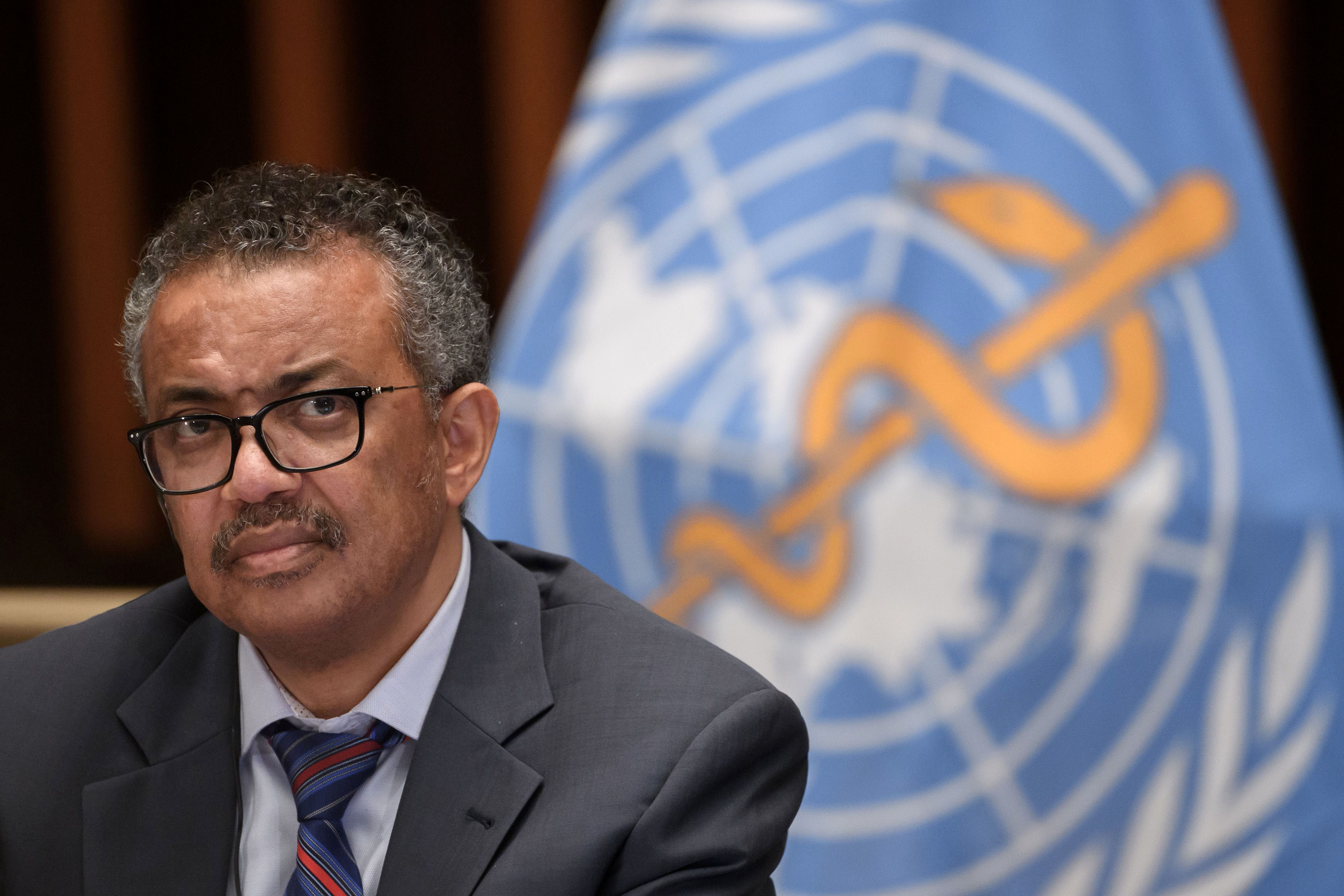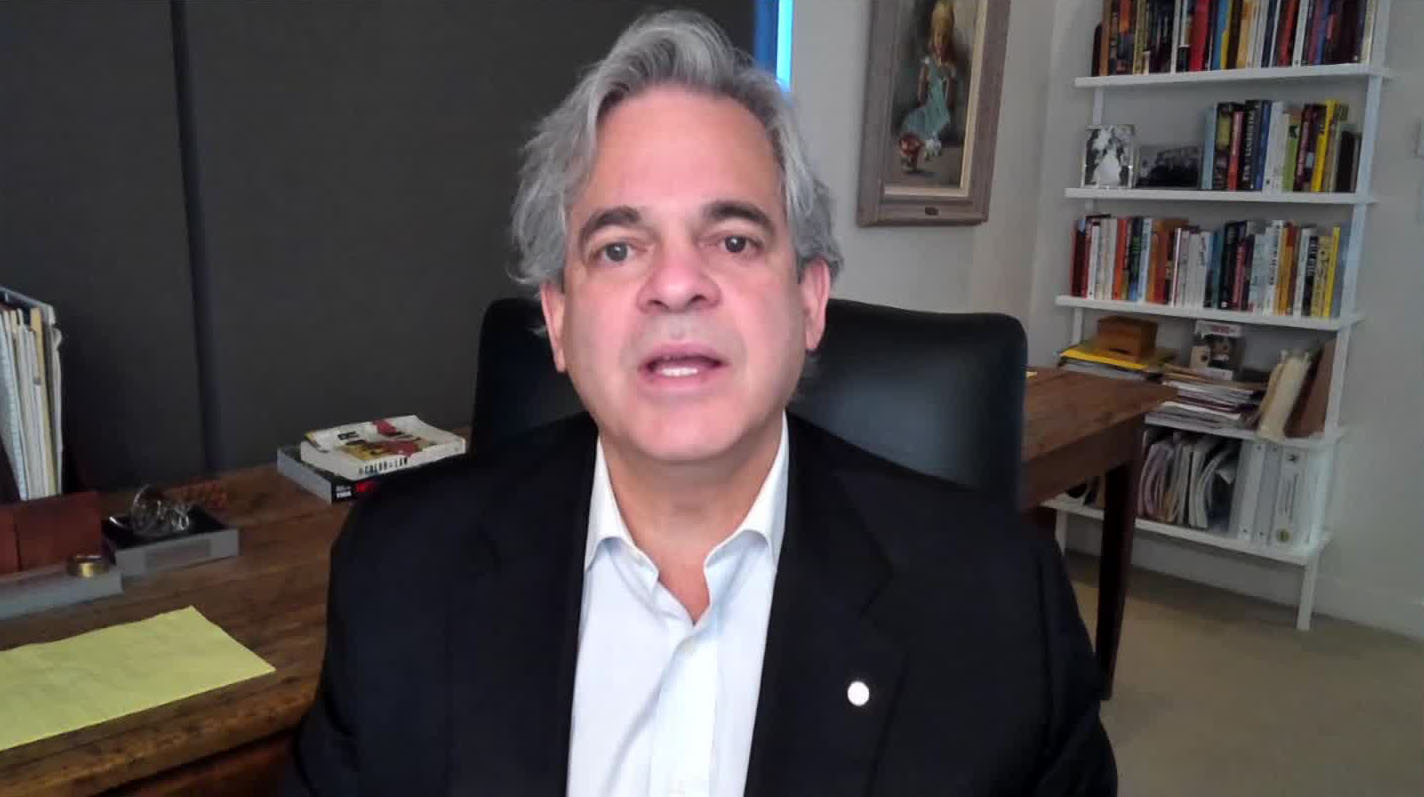"There will be no return to the old normal for the foreseeable future," WHO director-general says
From CNN Health’s Naomi Thomas
 Tedros Adhanom Ghebreyesus, director-general of the World Health Organization, attends a press conference in Geneva, Switzerland, on July 3. Fabrice Coffrini/Pool/AFP/Getty Images
Tedros Adhanom Ghebreyesus, director-general of the World Health Organization, attends a press conference in Geneva, Switzerland, on July 3. Fabrice Coffrini/Pool/AFP/Getty ImagesTedros Adhanom Ghebreyesus, director-general of the World Health Organization, said Monday “There will be no return to the old normal for the foreseeable future."
Speaking at a media briefing in Geneva, he added, “But there is a roadmap to a situation where we can control the disease and get on with our lives.”
In order to get to this place, Tedros said that three things would be required. These are a focus on reducing mortality and suppressing transmission; an “empowered, engaged community” that takes individual measures to protect the whole community; and strong government leadership and communication.
“It can be done. It must be done,” Tedros said.
Tedros said that there are no shortcuts out of this pandemic, and that while we hope for an effective vaccine, there must be a focus on using the tools that are available now to suppress transmission and save lives.
More than 8,000 patients are hospitalized with Covid-19 in Florida
From CNN's Artemis Moshtaghian and Christina Maxouris
There are a total of 8,038 patients hospitalized across the state of Florida with the primary diagnosis of coronavirus as of Monday morning, according to new numbers released by the Agency for Health Care Administration.
The three most populous counties: Miami-Dade, Broward, and Palm Beach County, are experiencing the highest numbers of coronavirus related hospitalizations.
Florida continues to record alarming rates of cases. Health officials reported Sunday a staggering record of new cases in a single day: 15,300.
If Florida were a country, it would be the fourth-highest in the world in reporting new cases. The state would rank 10th in terms of having the most cases, according to data from Johns Hopkins.
Some Detroit students are heading to summer school in-person today
From CNN's Meridith Edwards
Detroit Public Schools began summer classes today — the first time schools welcomed back some students for face-to-face instruction since the district closed in response to the coronavirus pandemic.
On top of in-person classes at some schools, the school district is also providing a distance learning summer program, according to the district's website.
The summer school program is voluntary: About 4,000 parents signed their children up for the classes, with more than half choosing face-to-face instruction. About 300 teachers signed up for 180 spots to teach in person.
What it's like in the classroom now: On Monday morning students and staff members will answer questions on a health form and have their temperature checked. They will be required to wear masks, and social distancing will be a priority.
Detroit schools are also disinfecting classes and buses daily and accepting fewer students per class.
As Brazil nears 2 million Covid-19 cases, the pandemic continues to devastate indigenous tribes
From CNN's Rodrigo Pedroso and Zamira Rahim
Brazil's indigenous citizens have been hit hard by the coronavirus pandemic. Indigenous people in Brazil often live in communities which are far from hospitals, in areas which often lack basic infrastructure. Those who move to towns or cities can end up in precarious living conditions with few public services, increasing their vulnerability to health issues.
According to the country's Special Indigenous Health Service (SESAI), more than 8,000 Brazilian indigenous people have so far contracted the virus since the beginning of the pandemic. The service only counts people living in indigenous territories, urban centers.
The President of Mato Grosso Indigenous Federation told CNN that Brazilian President Jair Bolsonaro's government has failed to adequately prepare for the pandemic.
“The doctors have to prescribe, not the president. The government did not take prevention seriously,” the President of Mato Grosso Indigenous Federation said.
Brazil is nearing 1.9 million cases of the novel coronavirus after its health ministry reported 24,831 new cases Sunday. It has the second highest number of Covid-19 cases in the world, behind only the US.
Bolsonaro, who tested positive for the virus last week, vetoed several points of a law aimed at protecting indigenous communities against Covid-19 last Wednesday, according to the government's official journal. The proposed legislation establishes an emergency plan to combat the pandemic in indigenous territories and classifies indigenous people and other traditional communities as "groups in situations of extreme vulnerability."
But the vetoes are not final. The law's text, which has already been approved by the country's Congress and Senate, must now be voted upon again. If a majority in both houses vote against the President's vetoes, the law will be approved in its entirety. Otherwise, the law will move forward without the vetoed parts.
The president has repeatedly dismissed the threat of the disease, and has a historically antagonistic relationship with indigenous Brazilians.
Watch CNN's latest reporting on the ground in Brazil:
Hong Kong tightens social distancing measures as coronavirus cases rise
From CNN’s Jadyn Sham in Hong Kong and Sophie Jeong in Seoul.
Hong Kong will tighten travel and social distancing measures, Chief Executive Carrie Lam said on Monday, as the city reported 52 new cases of Covid-19 in Hong Kong’s “third wave” of infections.
The measures will take effect starting midnight local time on Wednesday.
Here are details on the guidelines:
The Hospital Authority reported the eighth coronavirus death after a 95-year-old woman died Monday night. There are 1,521 confirmed Covid-19 cases in Hong Kong.
UN says more than 130 million people worldwide may go hungry in 2020 due to Covid-19
From CNN’s Ingrid Formanek and Hira Humayun
A UN report released Monday predicts the Covid-19 pandemic could send more than 130 million people around the world into chronic hunger by the end to 2020.
The UN’s Food and Agriculture Organization (FAO) published its latest edition of the State of Food Security and Nutrition in the World, which says the pandemic is “intensifying the vulnerabilities and inadequacies of global food systems.”
The report estimates “at a minimum, another 83 million people, and possibly as many as 132 million, may go hungry in 2020 as a result of the economic recession triggered by COVID-19.”
The report also estimates around 690 million people went hungry in 2019 – up by 10 million from the previous year.
Africa is the hardest hit region in terms of percentages, with 19.1% of its people undernourished, according to the report, followed by Asia at 8.3%, and Latin America and the Caribbean at 7.4%.
With the toll the pandemic is taking on food security, the report says achieving the Sustainable Development Goal of Zero Hunger by 2030 is in question.
"Failure at the statewide level" is the reason for Texas' coronavirus situation, Austin mayor says
From CNN's Aditi Sangal
 Texas, Austin Mayor Steve Adler on "CNN Newsroom" on July 13. CNN
Texas, Austin Mayor Steve Adler on "CNN Newsroom" on July 13. CNNAs coronavirus cases continue to increase in Texas, Austin Mayor Steve Adler said that it was failure at the statewide level that has brought Texas to its current coronavirus stage.
Texas' mask mandate went into effect on July 3, weeks after other states issued theirs. Many other states still do not have statewide mandates and there are no federal orders to wear masks.
The mayor said that a mask mandate sends a “clear message” when the message coming out of Washington is “harmful.”
“The message coming out of Washington is harmful, and it's dangerous and causing problems right now across the country. There needs to be a very clear message that masks are mandatory and have to be worn.”
Mayor Adler added that the city of Austin's mask mandate "bought some more time" — but it’s still on the edge.
“We've bought some more time, but if anybody's listening now from Austin, now is not the time to take the foot off the break. We are on the edge,” he said. “We had 17 more people admitted into our ICUs last night. That's a 10% increase. So we're still in a rough place.”
He added that he’s hearing from other hospitals near Austin, asking about ICU availability, and he’s expecting the demand to come from all over the state.
“What happens around the state impacts us,” he said. “We have been calculating our need based on our need and now we realize that it's going to be coming from all over the state. This needs a statewide and a [national] response.”
Watch more:
FDA gives "Fast Track" status to two Covid-19 vaccine candidates
From CNN Health’s Wes Bruer
Pfizer and BioNTech announced today that they have received "Fast Track" designations from the US Food and Drug Administration for two of their four Covid-19 vaccine candidates, according to a press release.
What this means: Fast Track designation allows for a more efficient development process between companies and regulatory agencies and makes drug developers eligible for accelerated approval with a rolling review process of submitted data.
Companies must request the designation and it is reserved for “any drug being developed to treat or prevent a condition with no current therapy obviously is directed at an unmet need,” according to the FDA’s website.
Next steps: Pfizer and BioNTech’s collaboration on Covid-19 vaccine development, dubbed “Project Lightspeed,” expects to begin phase 2b/3 of its trial later this month. The companies aim to enroll 30,000 participants, according to the press release.
Pending the success of ongoing studies, “the companies currently expect to manufacture up to 100 million doses by the end of 2020 and potentially more than 1.2 billion doses by the end of 2021.”
“We are pleased to have received Fast Track designation from the FDA for two of our vaccine candidates and look forward to working closely with the FDA, along with our partner Pfizer, to expedite the clinical development path forward,” Özlem Türeci, chief medical officer at BioNTech, said in the statement.
White House doesn't offer any defense for Fauci as tensions rise
From CNN's Betsy Klein
 White House press secretary Kayleigh McEnany holds a news conference at the White House on July 6. Kevin Dietsch/UPI/Bloomberg/Getty Images
White House press secretary Kayleigh McEnany holds a news conference at the White House on July 6. Kevin Dietsch/UPI/Bloomberg/Getty ImagesWhite House press secretary Kayleigh McEnany didn’t offer any defense or pushback on the narrative of tension between the White House and Dr. Anthony Fauci when asked about his relationship with the task force Monday, instead saying the nation’s top infectious disease expert simply “represents one viewpoint in the administration.”
“The Admiral [Brett Giroir] hit the nail on the head on this yesterday. He was making the point that Dr. Fauci represents one viewpoint in the administration and he looks at things from a public health standpoint,” McEnany said during an appearance on Fox News.
She continued:
Remember: These remarks come as Trump and Fauci haven’t spoken in over a month.
On school reopening, McEnany claimed House Speaker Nancy Pelosi isn’t looking at data or science when she was critical of the administration’s reopening plans and is “messing with our children.”
She was asked how the administration’s guidelines would differ from CDC guidelines – though it’s unclear what Trump administration guidelines the host was referring to. Regardless, McEnany said, “We leave it to localities as to exactly what guidelines work.” She said CDC guidelines are “out there as a best case scenario,” but many of its measures are “not possible or not feasible.”
“These are perfect-world guidelines,” she said of the CDC’s recommendations.

 5 years ago
743
5 years ago
743 

